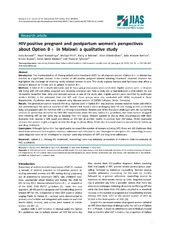| dc.contributor.author | Katirayi, Leila | en_US |
| dc.contributor.author | Namadingo, Hazel | en_US |
| dc.contributor.author | Phiri, Mafayo | en_US |
| dc.contributor.author | Bobrow, Emily A | en_US |
| dc.contributor.author | Ahimbisibwe, Allan | en_US |
| dc.contributor.author | Berhan, Aida Yemane | en_US |
| dc.contributor.author | Buono, Nicole | en_US |
| dc.contributor.author | Moland, Karen Marie | en_US |
| dc.contributor.author | Tylleskär, Thorkild | en_US |
| dc.date.accessioned | 2017-04-18T11:53:55Z | |
| dc.date.available | 2017-04-18T11:53:55Z | |
| dc.date.issued | 2016-06-15 | |
| dc.Published | Journal of the International AIDS Society 2016, 19(1) | eng |
| dc.identifier.issn | 1758-2652 | |
| dc.identifier.uri | https://hdl.handle.net/1956/15696 | |
| dc.description.abstract | Introduction: The implementation of lifelong antiretroviral treatment (ART) for all pregnant women (Option B+) in Malawi has resulted in a significant increase in the number of HIV-positive pregnant women initiating treatment. However, research has highlighted the challenge of retaining newly initiated women in care. This study explores barriers and facilitators that affect a woman’s decision to initiate and to adhere to Option B+. Methods: A total of 39 in-depth interviews and 16 focus group discussions were conducted. Eligible women were ≥18 years old, living with HIV and either pregnant and receiving antenatal care from a study site or had delivered a child within the last 18 months, breastfed their child and received services at one of the study sites. Eligible women were identified by healthcare workers (HCWs) in the antenatal clinic and ART unit. Focus groups were also conducted with HCWs employed in these departments. Qualitative data were analyzed using Maxqda version 10 (VERBI Software, Berlin, Germany). Results: The general perception towards the drug regimen used in Option B+ was positive; women reported fewer side effects and acknowledged the positive benefits of ART. Women felt hopeful about prolonging their life and having an HIV-uninfected baby, yet grappled with the fact that ART is a lifelong commitment. Women and HCWs discussed challenges with the counselling services for prevention of mother-to-child HIV transmission under the new Option B+ guidelines, and many women struggled with initiating ART on the same day as learning their HIV status. Women wanted to discuss their circumstances with their husbands first, receive a CD4 count and obtain an HIV test at another facility to confirm their HIV status. HCWs expressed concern that women might just agree to take the drugs to please them. HCWs also discussed concerns around loss to follow-up and drug resistance. Conclusions: Although Option B+ has significantly increased the number of women initiating ART, there are still challenges that need to be addressed to strengthen initiation, adherence and retention in care. Strategies to strengthen the counselling services upon diagnosis need to be developed to improve same-day initiation of ART and long-term adherence. | en_US |
| dc.language.iso | eng | eng |
| dc.publisher | The International AIDS Society | eng |
| dc.rights | Attribution CC BY | eng |
| dc.rights.uri | http://creativecommons.org/licenses/by/3.0/ | eng |
| dc.subject | Option B+ | eng |
| dc.subject | lifelong HIV treatment | eng |
| dc.subject | counselling | eng |
| dc.subject | same-day initiation | eng |
| dc.subject | prevention of mother-to-child transmission of HIV | eng |
| dc.subject | qualitative | eng |
| dc.title | HIV-positive pregnant and postpartum women's perspectives about Option B+ in Malawi: A qualitative study | en_US |
| dc.type | Peer reviewed | |
| dc.type | Journal article | |
| dc.date.updated | 2016-12-15T13:15:53Z | |
| dc.description.version | publishedVersion | en_US |
| dc.rights.holder | Copyright 2016 The Author(s) | |
| dc.identifier.doi | https://doi.org/10.7448/ias.19.1.20919 | |
| dc.identifier.cristin | 1375676 | |

